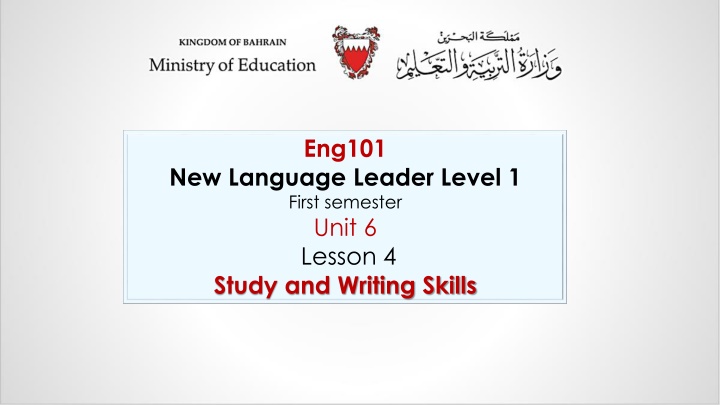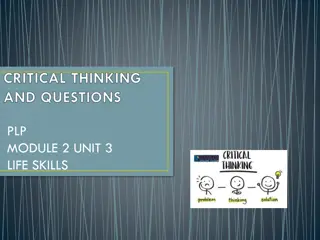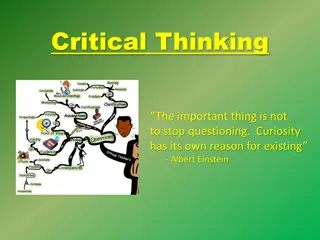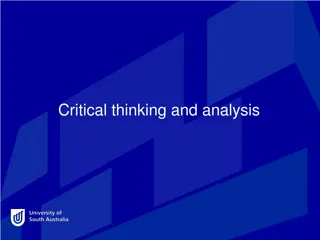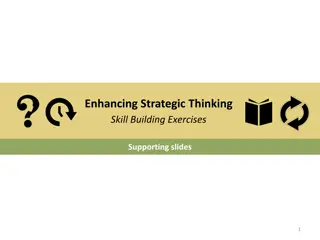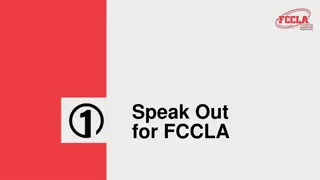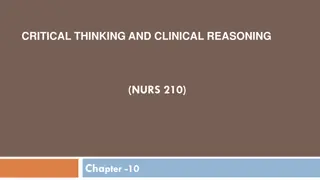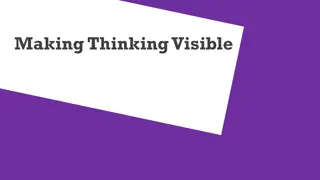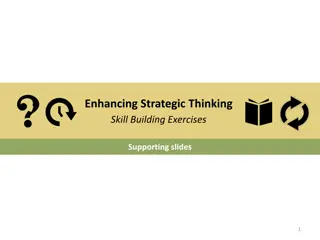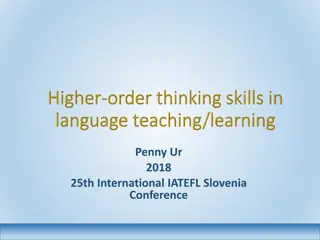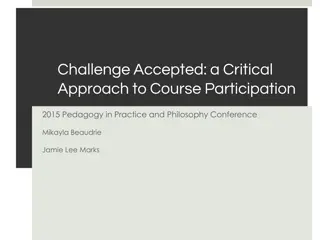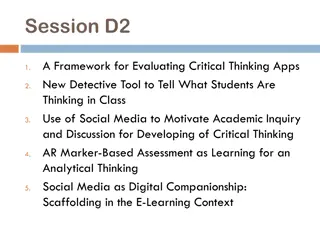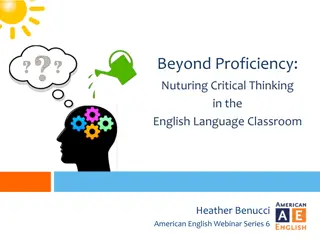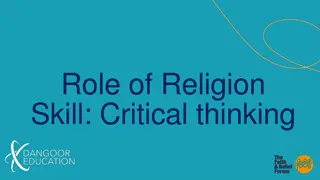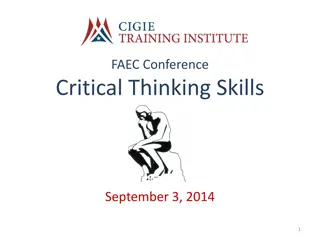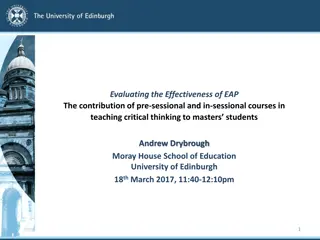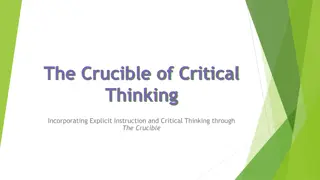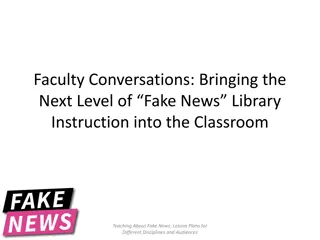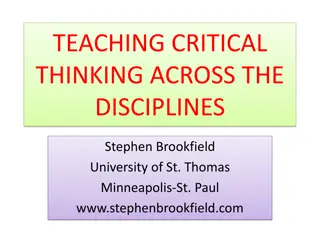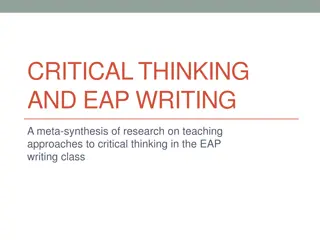Developing Critical Thinking Skills in Language Learning
Enhance critical thinking skills in language learning by analyzing texts, revising writing structures, and writing articles about your country. Explore the concept of critical thinking, its importance in reading comprehension, and how it aids in forming opinions and making judgments. Engage in thought-provoking questions to foster a questioning attitude towards learning.
Download Presentation

Please find below an Image/Link to download the presentation.
The content on the website is provided AS IS for your information and personal use only. It may not be sold, licensed, or shared on other websites without obtaining consent from the author.If you encounter any issues during the download, it is possible that the publisher has removed the file from their server.
You are allowed to download the files provided on this website for personal or commercial use, subject to the condition that they are used lawfully. All files are the property of their respective owners.
The content on the website is provided AS IS for your information and personal use only. It may not be sold, licensed, or shared on other websites without obtaining consent from the author.
E N D
Presentation Transcript
Eng101 New Language Leader Level 1 First semester Unit 6 Lesson 4 Study and Writing Skills
Eng101 New Language Leader Level 1 OBJECTIVES By the end of the lesson, students will be able to o identify critical thinking. o analyse an article for a competition. o revise paragraph and sentence structure. o write an article about their country.
Eng101 New Language Leader Level 1 Think! What does critical thinking mean? Critical thinking means asking questions about what you see, hear or read. How is it useful in reading ? Critical thinking can help you understand reading texts better.
Eng101 New Language Leader Level 1 Critical thinking Which of these questions are examples of critical thinking? 1. How many students are there in your classroom? 2. Is it true that most people will live long life in the future? 3. Why do many people prefer to live with their parents after they get married? 4. How high is Burj Al Arab tower? 5. How do we know that the gap between parents and children will increase? 6. What will you do if you don t win the competition? Eng101 New Language Leader Level 1 6.4 Study & Writing Skills
Eng101 New Language Leader Level 1 Read the lecture about critical thinking and then answer the following questions. Janet Foster JF: Good morning, everyone. All: Good morning. JF: Thank you for inviting me to speak to you today. My name s Janet Foster and I work in the Learning Recourses Centre. I ve been at Harvard University for five years, but this is my first visit to the English language department, so I m very pleased to be here. As you know, our topic today is critical thinking. It is very important when you study at this level to have an idea about critical thinking". What does it mean exactly? How does it help you understand reading texts better? This morning, I ll explain some important ideas about critical thinking, and I ll explain how critical thinking can help you as a language learner. If you have any questions, I ll deal with them at the end of this lecture if that s convienent. Now, I m sure we all know what we mean by thinking , but what about the word critical ? Maybe critical sounds rather unfriendly to you, like saying someone or something is bad or wrong. But when we talk about critical thinking, we don t just mean critical in this rather negative sense. It s true, we re talking about an attitude or a way of looking at the world, but it s not a negative attitude.
Eng101 New Language Leader Level 1 Instead, critical thinking means that we have a questioning attitude towards things. We ask questions about things. But these questions are not questioning about facts. Let me give you an example. If I ask, What s the biggest continent in the world? , maybe you know the answer already. Or simply you can check quickly on the internet. So, this isn t the kind of question we ask when we do critical thinking. Instead, in critical thinking, we ask about the reasons for something or we try to judge something to form an opinion about it, to decide if it s good or bad. So, we ask questions like, Why is he or she saying that? , What s the reason for that? , Is that a good idea? These are critical thinking questions. texts for a minute. If you ask questions about the text while you re reading, you ll probably understand the text better. So, critical thinking can help you to improve your reading comprehension. One question you can always ask is, Why is the writer writing this text? What s the writer s aim? Look for reasons why the writer wrote that text. Is the writer just giving you some information? Or trying to persuade you that his or her ideas are good? Another question you can ask when you read is, How do I know that what I am reading is true? To do this, you must look for evidence or proof. If the writer makes a point, see if he or she gives evidence to support that point. If someone gives us evidence, for example some data, then that makes the argument stronger. If there s evidence, it s more difficult for us to say, Your ideas are wrong . How can this critical thinking help us learn a language? Well, let s think about reading
Eng101 New Language Leader Level 1 Finally, another question that you can ask is, What s the relationship between the ideas in the text? Maybe this is a little difficult to understand but, for example, ask yourself, Is the text describing a problem and giving a solution to that problem? Or Is the text comparing and contrasting two things looking at similarities and differences? Or again, Is the text looking at causes and effects the reason why something happens and the results of that? If we understand these relationships between different parts of the text, we can understand the whole text a lot better. forget, too, critical thinking doesn t mean thinking only by yourself; you can work with other students and discuss things together. Critical thinking can be a group activity. So, what I d like you to do now is . So, as I ve said, critical thinking in its simplest form is about asking questions and don t Eng101 New Language Leader Level 1 6.4 Study & Writing Skills
Eng101 New Language Leader Level 1 1. According to the text, what does critical thinking mean? Critical thinking means that we have a questioning attitude towards things. 2. Name three things you can look for in a text to help you understand reading texts better? 1. Look for reasons why the writer wrote the text. Was it to provide information, or to persuade you of something? Look for evidence, e.g. data. This makes an argument stronger. Look for relationships between different ideas in the text, relationships between different parts of the text, e.g. problem and solution, cause and effect. 2. 3.
Eng101 New Language Leader Level 1 Think! 1. What does Judging reliability mean? Judging reliability means to ask questions about where information comes from, to know if it is true or reliable.
Eng101 New Language Leader Level 1 Judging reliability Which of these sources of information do you trust most? Put them in order from(1-5). Note: (1= the most reliable). 1. A blog. 4 2. A major national news channel. 2 3. A webpage from 2002. 5 4. Something your parents tell you. 3 1 5. A government website. Eng101 New Language Leader Level 1 6.4 Study & Writing Skills
Eng101 New Language Leader Level 1 Considering evidence Look at these facts. How do you know they are true? 1. The population of the kingdom of Bahrain was nearly half million in 1999. From official census data. 2. People cannot live without fresh air and clean water. From science and broad human experience. Eng101 New Language Leader Level 1 6.4 Study & Writing Skills
Eng101 New Language Leader Level 1 Think! 1. How can you prove your idea or point of view? By giving evidence (number of studies many years several countries similar results) Eng101 New Language Leader Level 1 6.4 Study & Writing Skills
Eng101 New Language Leader Level 1 Read the following paragraph about a family s unit and underline the sentences that prove the writer s idea or point of view. A family unit is important for raising children. Without it, it is difficult for a child to grow up as a normal and healthy human being. A number of studies over many years have shown this. These studies took place in several countries around the world, with very similar result. A family unit is important for raising children. Without it, it is difficult for a child to grow up as a normal and healthy human being. A number of studies over many years have shown this. These studies took place in several countries around the world, with very similar result. Eng101 New Language Leader Level 1 6.4 Study & Writing Skills
Eng101 New Language Leader Level 1 Think! 1. How can you develop your self- awareness? By asking questions about yourself, the reasons why you do things and the results of your actions. Eng101 New Language Leader Level 1 6.4 Study & Writing Skills
Eng101 New Language Leader Level 1 Developing self- awareness Write three questions you can ask yourself to develop self-awareness. Possible answer Why am I doing this? What do I want to get from this? What did I learn from that experience? How can I do that better in the future? .. Eng101 New Language Leader Level 1 6.4 Study & Writing Skills
Eng101 New Language Leader Level 1 Think 1. Have you ever entered a competition? 2. Have you ever written anything for a competition? 3. Have you ever won a competition? Eng101 New Language Leader Level 1 5.4 Study & Writing Skills
Eng101 New Language Leader Level 1 Read this poster. Then answer the following questions What makes you proud of your society today? The Global Magazine for Youth invites young people around the world to write a short article about what makes them proud of their society today (maximum 200 words). The top 10 entries will receive a prize of 350 US dollars and will appear on the magazine s website. Global Writing Competition 1. How can you win a prize? You need to write a maximum of 200 words on the topic of what makes you proud of your society today. 2. How many people will win a prize? 10 people will win a prize. Eng101 New Language Leader Level 1 6.4 Study & Writing Skills
Eng101 New Language Leader Level 1 Read the following competition entry and then answer the following question. What to choose? Our education system, our gifted and creativity center or our youth society. It s very difficult to choose, as I am so proud of many things in my society. Two things, however, make me especially proud of my society. The first thing is that my country is being name The land of peace so you see people of many different races, colours and religions all live and work side by side - it is called a multicultural society. I think it s a great example of how people can come together and create a mixed, peaceful society. The second thing is less obvious as it often happens out of sight. It s the fact that every day of the year, thousands of people do voluntary work. They give up their time to help others for nothing. They help their local hospitals and communities, look after old people and do things to raise money for good causes. Because of these things, I feel proud of my society and see a positive future for it. I think it is very important to help others and contribute to your society. My country has given me a lot and it is time to give something back. Julie 1. What do you think the judges liked and disliked about the competition entry? Think about ideas, organization of ideas, etc. Possible answers: They liked: her choice of topics, its modernity, her willingness to contribute herself, her positive outlook, her good writing style The only thing they did not like was her failure to write using paragraphs. Eng101 New Language Leader Level 1 6.4 Study & Writing Skills
Eng101 New Language Leader Level 1 Paragraph organisation Look at Julie's answer in the previous slide again. Divide it into four paragraphs. 1.What to choose? Our education system, our gifted and creativity center or our youth society. It s very difficult to choose, as I am so proud of many things in my society. Two things, however, make me especially proud of my society. 2. The first thing is my country is called The land of peace so you see people of many different races, colours and religions all live and work side by side -It is called a multicultural society. I think it s a great example how people can come together and create a mixed, peaceful society. 3. The second thing is less obvious as it often happens out of sight. It s the fact that every day of the year, thousands of people do voluntary work. They give up their time to help others for nothing. They help their local hospitals and communities, look after old people and do things to raise money for good causes. 4. Because of these things, I feel proud of my society and see a positive future for it. I think it is very important to help others and contribute to your society. My country has given me a lot and it is time to give something back. Julie
Eng101 New Language Leader Level 1 1.What is the topic of paragraphs 2 and 3 of Julie s answer. Paragraph 2: multicultural society. Paragraph 3: voluntary work. 2.What evidence does Julie give for the two main things she is proud of? Multicultural society: people of different races, colours and religions live and work together. Voluntary work: thousands of people help in hospitals, look after the old and raise money. Eng101 New Language Leader Level 1 6.4 Study & Writing Skills
Eng101 New Language Leader Level 1 Think! 1. How to join related sentences together to make one sentence? By omitting the repeated information. Eng101 New Language Leader Level 1 6.4 Study & Writing Skills
Eng101 New Language Leader Level 1 Sentence structure Join these sets of sentences to make one sentence. 1. Julie studies marketing at university. She lives with her parents. She helps with house work in her free time. Julie studies at university, lives with her parents and helps with house work in her free time. 2. Julie s brother goes to high school. He likes films. He wants a home theatre. Julie s brother goes to high school, likes films and wants a home theatre. Eng101 New Language Leader Level 1 6.4 Study & Writing Skills
Eng101 New Language Leader Level 1 Write 180-200 words Write an article to your school magazine expressing what makes you proud of your society today? . Give at least two reasons. Use the outline below to help you write: Paragraph 1: introduction Paragraph 2: first reason Paragraph 3: second reason Paragraph 4: conclusion Note: remember to use linkers such as so, as and because. Reminder: use the model on slide 18 to help you write. Eng101 New Language Leader Level 1 5.4 Study & Writing Skills
Eng101 New Language Leader Level 1 Suggested answer I find it very difficult to decide as I am so proud of many things in my society today. I am so proud of our educational system, the Royal Humanitarian Foundation and the National volunteering Platform. Two things, however, make me especially proud of my society. that was established in 2001 by His Majesty King Hamad Bin Isa Al Khalifa for the purpose of caring for Bahraini orphans coming from eligible families and providing care of widows as well. The organization is an example of how the government cares for all citizens and provides the suitable living conditions to every member of our society. First, I am proud of the Royal Humanitarian Foundation . It is a non-profit organization Volunteering Platform. It provides details about the diverse volunteering opportunities available within the Kingdom of Bahrain. The platform aims to promote loyalty, responsibility and tolerance. It also aims to create an environment conducive to volunteering and to connect volunteers from all parts of the country. In addition to the Royal Humanitarian Foundation , I do take pride in our National think it is very important to help others and contribute in your society. My country has given me a lot and it is time for me to give something back. Because of these things, I feel proud of my society and see a positive future for it. I Eng101 New Language Leader Level 1 6.4 Study & Writing Skills
Eng101 New Language Leader Level 1 Self Assessment I write about all the points. I use linkers. I write 4 paragraphs. I write a maximum of 200 words. I use correct spelling. I use correct punctuation marks & the right capitalization. I follow the correct layout. Eng101 New Language Leader Level 1 6.4 Study & Writing Skills
Eng101 New Language Leader Level 1 End of lesson! Thank You! Eng101 New Language Leader Level 1 6.4 Study & Writing Skills
